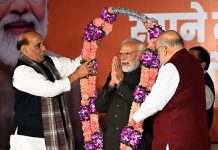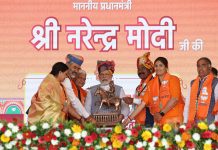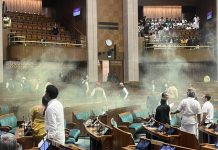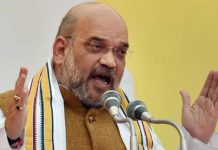India has been frequently targeted by foreign terrorist attacks for more than a decade, costing us lives and bringing in shock and fear amongst common people. For a democracy that has sustained in a vitiated political neighborhood where military juntas, army controlled governments and dictatorships continue to rule, attacks on Indian soil spell more than just hostility over a stretch of land in Kashmir. They attack a way of life and a thought process of tolerance and enterprise.
 Yet, in the world of Hindi cinema, you would be hard pressed to find too many films that actually tell stories of terrorism as it is. Often terrorism or terrorists become a backdrop to hyperbole and melodrama. Gun totting maniacs are tagged as the bad guys, and made into villains. Most films don’t go beyond the surface level, never approaching subjects centered on terrorism with a research-based approach. A filmmaker might begin looking at terrorism or insurgency with noble intent, but as they begin the process of making a film, the end result often gets diluted.Authentic research and writing based on such research are sorely lacking.
Yet, in the world of Hindi cinema, you would be hard pressed to find too many films that actually tell stories of terrorism as it is. Often terrorism or terrorists become a backdrop to hyperbole and melodrama. Gun totting maniacs are tagged as the bad guys, and made into villains. Most films don’t go beyond the surface level, never approaching subjects centered on terrorism with a research-based approach. A filmmaker might begin looking at terrorism or insurgency with noble intent, but as they begin the process of making a film, the end result often gets diluted.Authentic research and writing based on such research are sorely lacking.
Commercial interests and the pressure to play it safe, to be politically neutral, come in the way of films attempting to tell gritty, reality based stories about terrorism. What you get is a melodramatic Misson Kashmir, inadequate in its background research and yet, made by Vidhu Vinod Chopra, a Kashmiri Pandit. Otherwise, filmmakers like Mani Ratnam have touched upon the impact of terrorism on the lives of people in films like Dil Se, which looks at the life of a suicide bomber. Ratnam did approach an insurgent’s character with depth and layers in Roja, where Pankaj Kapur promises to reform himself in the end. Then there’s Aamir by Rajkumar Gupta, a gripping portrayal of a man forced to turn a suicide bomber, touching but politically passive. Nikhil Advani tackled homegrown terror and crime in D Day, which a filmy ending to the Dawood Ibrahim story that completely pandered to the front rows.
As cinema is changing swiftly across the mainstream in India, adapting to reality has slowly become a necessity for filmmakers. Some that have complained about not getting funds or a suitable producer to back films based in reality are finally getting opportunities to present those stories that they have always wanted to tell.
Omerta, by Hansal Mehta, is one of the best examples of such films. Set to release this April (20 April), the film is a gripping thriller centered on the life of Omar Saeed Sheikh, a British born Pakistani terrorist. Saeed has wreaked havoc on Indian soil and also masterminded some of the most high profile terrorist attacks in recent memory. Be it the blood thirsty assassination of journalist Daniel Pearl, or funding the 9/11 attacks, Omar, an educated and polished British man, was behind these chilling incidents. He was also integral to recruitment and training of Western and local youth for terror camps, and part of training suicide bombers in Pakistan. Rajkummar Rao, the finest actor that India has today, plays Saeed Sheikh with a touch of the diabolic sophisticate. He is brilliant, and has called his much-applauded role “the toughest that I have done so far.” Omerta, while incomplete in exploration of what made Omar Saeed such a fanatic, is an engaging portrayal of what makes a master terrorist, brick by brick. Mehta has utilized background information from media coverage to write out a chilling portrayal of Omar Saeed Sheikh.
Like Mehta, debutante director Aditya Dhar has found his inspiration in the 2016 Uri attacks by the Indian Defence forces. This film takes the route of a thriller, focusing on the bravery and strategic brilliance of the Indian Army in selectively attacking terror camps across the Pakistan border. In retaliation of a series of bloody attacks on the Defence forces by Pakistani terrorists, Dhar has written this film based entirely on media reports and conversations with military experts. The talented young actor Vicky Kaushal will act in it, and Ronnie Screwvala will produce it under his new company, RSVP. With bright young actors like Yami Gautam and Kriti Kulhari joining it’s cast, Uri promises to be a slick, engaging film about a key military operation that was carried quite recently. Its currency makes the film a hook for young audiences too.
In May, director Meghna Gulzar’s Raazi will release. Based on the book Calling Sehmat by Harinder Sikka, this film tells the story of a young female spy of Indian origin. A Kashmiri college student takes on the mantle of passing on crucial intelligence about Pakistani Army sponsored operations to the Indian Army; the book draws from real life incidents. In this film, Alia Bhatt, a popular young star today, is married to the son of a Pakistani Army general, having access to important information. Raazi is eagerly awaited for it’s true to life, gripping story.
What these films establish is the fact that despite a random Censor Board, that has a legacy of hacking off words, sentences, dialogues and scenes to keep Indians ‘protected’, filmmakers and producers are treading into politically volatile and sometimes, controversial territory. They will focus on the patriotism trump card to make their films viable no doubt. Even so, that they will make films adapted from real incidents involving the Indian Defence forces, diplomacy and the complex politics of Kashmir, is a positive start.
In Hollywood and international cinema, recent US armed interventions in Iraq and Afghanistan have inspired brilliant films and TV series. Be it the Oscar nominated films Zero Dark Thirty about the hunt for Osama Bin Laden, or The Hurt Locker, and American Sniper, The Green Line etc, Hollywood has taken a tough look at America’s
terror policy. Criticism and analysis are part of their story telling. With recent shows like The Looming Tower, or Homeland, American TV continues to take a critical, reality driven angle to their government’s role in military interventions, and aggressive anti-terrorism measures. Similarly, Vishal Bharadwaj, a filmmaker that has addressed typical Indian stories with universal flair, is currently in the process of adapting The Exile, a book by Kathy Scott Clark and Adrian Levy.
Bharadwaj will focus on the story before USA seriously hunkered down to find Osama Bin Laden. Based on thorough research, and exceptionally well thought out analysis, Scott Clark and Levy detail how Bin Laden was evacuated from Tora Bora in Afghanistan just thirty feet before US troops were ready to capture him. It looks at the special hidden place Bin Laden was given, and explore the link between the terror attack on the Indian parliament to Osama Bin Laden. It also takes a critical look at Pakistani ISI strategy to keep Osama hidden as that ensured inflow of more than a billion US dollars of aid money for a decade. Bharadwaj’s razor sharp writing holds promise of blowing the lid off Pakistan’s betrayals of international opinion and heinous strategy. It also brings the story as it played out from inside the complex where Osama was kept under strict protection.
Nikhil Advani, whose D Day took a filmy turn and adaptation of the first season of Homeland as Prisoners of War for Hotstar India didn’t quite win audiences, has pledged to make a film on the Batla House encounter. Advani will also focus on what really happened inside this building before and during the encounter with security forces. He wants to look at whether those brands terrorists here, could have just been students.
Filmmakers with experience and with dedicated teams working on writing and research for films that adapt real life terrorism is a positive sign for Hindi cinema. Films have to become oriented towards our reality for them to remain relevant to a 18 to 35 audience that has a large number of options on streaming platforms and from Hollywood.
Besides, these stories reflect the evolution of India as a nation, and the crucial role that our defence forces play in keeping us safe. They can be educative and reflective. One hopes, that with so many filmmakers attempting such content, we get to see some truly engaging and quality films around terrorism and it’s damaging consequences, that also connect with India’s mass audiences.
letters@tehelka.com













